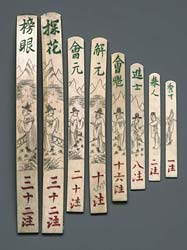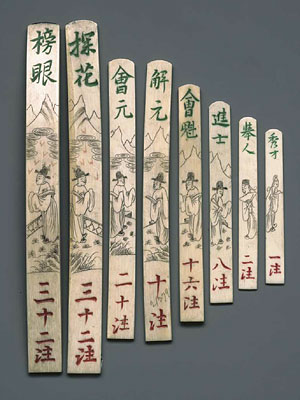The principle behind the game is simple. Players take turns rolling a pair of dice to determine where they begin on the bureaucratic ladder and then either get promoted or demoted on subsequent throws. There is one other crucial difference between Chinese promotion games and snakes-and-ladders-type games played elsewhere. In the latter, the number of positions that a player moves is exactly the same as the number yielded by the throw of the dice; thus if a player throws a six, he moves forward six positions on the board. In Chinese promotion games, on the other hand, there is no counting of squares. Instead, at each official position are listed possible movements to other positions, according to the outcome of specific dice rolls.
One of the most intriguing aspects of the game was that it incorporated the idea of meritorious reward and punishment, referring to the reasons for promotion or demotion taken from the official histories of the Han period. In a sense, the aim of Chinese promotion games is not totally dissimilar from that of Monopoly; the object of the former was to accumulate political power (and thereby wealth and glory), and of the latter to accumulate real estate. Yet, unlike Monopoly, Chinese promotion games also included a moral and didactic component.






